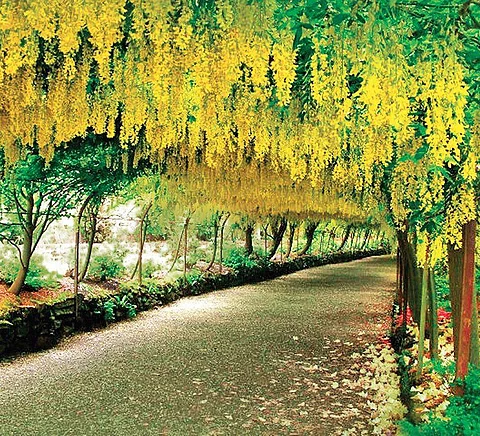

The summer of sweltering discontent has come to north India. I hate the heat. And I don’t particularly care for either mangoes or lychees, which are the seasonal fruit of the north Indian summer. So for someone like me, one of the few nice things about a Delhi summer is that the amaltas, the Indian laburnum, comes into blossom.For most of the year the amaltas is a nondescript specimen, its scant foliage and gawky branches giving it an air of gauche adolescence. And then suddenly, almost overnight, the amaltas bursts into its bloom of incandescent yellow, from which it derives its other name of the ‘golden shower’ tree.
I watch the amaltas outside my window, glowing globules of sunlight turned by some joyous alchemy into flowers. I try to describe the tree in words. But the more I try, the more the beauty of the tree escapes my attempts. The words that I put together to capture the tree skitter away, like beads from clumsy fingers trying to string a necklace.
It’s not just the amaltas, and it’s not just me. That which is beautiful is an unfailing astonishment, and an equally inevitable frustration. The elegiac splendour of sunset, the dazzle of a dragonfly’s wings, the swirl of the Milky Way mirroring the spiral of the DNA of which we are made. So much and such effortless beauty. Yet when we try and mime it, it mocks our efforts.
Though all of us recognise and respond to that which we call beautiful, beauty remains for the great majority of us a cruel mirage, forever out of reach. For only to a few, a very few of us, is given the capacity to create the beautiful; a handful of poets and artists, musicians and mathematicians, with their theorems and equations as elegant and expressive as the dancer’s mudra. The rest of us stand outside this charmed circle, tantalised by a will-o-the-wisp we can never grasp.
Is it out of spite then, the vengeful rage of a child throwing a tantrum because he cannot have his way, that we turn so easily and so ceaselessly to the creation of the opposite of beauty, to the manufacturing of ugliness?
We are so inventive, so ingenious in the making of ugliness. We make it constantly, through our violence and our wars and our hatreds, through the stench and squalor of our cities, through the festering sores of poverty and the brutal contempt of power and privilege. Inexhaustible, our ugliness, and our endless ability to reproduce it.
I wonder what the secret of beauty is, the secret of the amaltas tree. Why does the beautiful elude us when it comes so naturally to the tree? Why is it not in our nature, as it is in that of the amaltas? Or could it be that it is indeed there, in us, but we cannot see it, or sense it, or feel it, because we are too anxious and too covetous to ensnare it. To enmesh it in a web of words, or in the stipple of paint and canvas, or through the lens of a camera, or in cadences of sound.
We see the beautiful as something to possess, to seize and to hold on to. An object of art, a painting, a statue, a stanza of verse, a diamond aflame with inner fire, a sunrise stuck in a holiday photo album.
A possession, like a piece of real estate, or a bank account, whose value in terms of hard cash or the subtler currency of sentiment can be gauged and compared, and which can be hoarded and locked away in steel vaults or in the intangible but no less imprisoning confines of legal copyright. To us, beauty comes with a price tag, a title of ownership.
The amaltas doesn’t know it owns its beauty. In its ignorance it gives away its loveliness to all those who chance upon it. Is it this giving away, this feckless generosity which thinks nothing of making a gift of itself, to anyone and no one and everyone, the secret of the amaltas, the secret of beauty?
A single yellow flower drifts down to the waiting dust.jugsuraiya@gmail.com